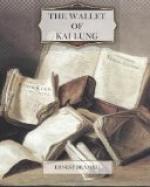upon returning and consulting his written parchments,
it became plain to him that he had indulged in a very
objectionable exhibition, as he himself was the person
most interested in the success of the matter.
Far from discouraging him, however, such incidents
tended to his advantage, as he could consistently
point to them in proof of his unquestionable commercial
honourableness, and in this way many persons of all
classes, not only in Canton, or in the Province, but
all over the Empire, would unhesitatingly entrust
money to be placed in undertakings which he had purchased
and was willing to describe as “of much good.”
A certain class of printed leaves—those
in which Chang-ch’un did not insert purchased
mentions of his forthcoming ventures or verses recording
his virtues (in return for buying many examples of
the printed leaf containing them)—took
frequent occasion of reminding persons that Chang-ch’un
owed the beginning of his prosperity to finding a written
parchment connected with a Mandarin of exalted rank
and a low caste attendant at the Ti-i tea-house among
the paper heaps, which it was at that time his occupation
to assort into various departments according to their
quality and commercial value. Such printed leaves
freely and unhesitatingly predicted that the day on
which he would publicly lose face was incomparably
nearer than that on which the Imperial army would
receive its back pay, and in a quaint and gravity-removing
manner advised him to protect himself against an obscure
but inevitable poverty by learning the accomplishment
of chair-carrying— an occupation for which
his talents and achievements fitted him in a high
degree, they remarked.
In spite of these evilly intentioned remarks, and
of illustrations representing him as being bowstrung
for treacherous killing, being seized in the action
of secretly conveying money from passers-by to himself
and other similar annoying references to his private
life, Chang-ch’un did not fail to prosper, and
his undertakings succeeded to such an extent that
without inquiry into the detail many persons were
content to describe as “gold-lined” anything
to which he affixed his sign, and to hazard their
savings for staking upon the ventures. In all
other departments of life Chang was equally successful;
his chief wife was the daughter of one who stood high
in the Emperor’s favour; his repast table was
never unsupplied with sea-snails, rats’ tongues,
or delicacies of an equally expensive nature, and it
was confidently maintained that there was no official
in Canton, not even putting aside the Taotai, who
dare neglect to fondle Chang’s hand if he publicly
offered it to him for that purpose.




